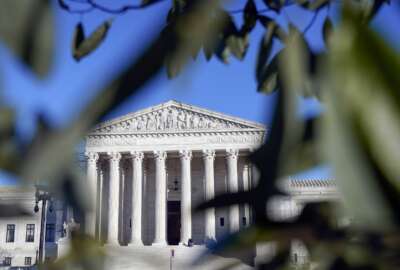Unelected bureaucrats do the darndest things
Unelected civil servants mostly work to stay with the law and administrative norms. The Chevron challenge is complicated.
You probably never heard of the Columbus & Ohio River Railroad. Its distinctively-painted locomotives haul freight along a 150-mile or so route between Mingo Junction and Columbus Ohio, with branches to places including Mt. Vernon and Cadiz. Sadly, an employee of the line died on the job the other day. Details unknown.
But, we — and the deceased employee’s loved ones — will know. The National Transportation Safety Board will send someone, maybe a couple of people, out to investigate. They’ll interview officials and co-workers, and probably traipse through frigid air to look at a rail yard and its rolling and fixed stock.
Another day in the life of infamous, unelected bureaucrats.
UBs, let’s call them, are back in the news. Earlier this week, as you no doubt read, the Supreme Court heard arguments in a challenge to so-called Chevron deference. Under this doctrine, established by the Court back in 1984, courts generally defer to how federal agency staff interpret how laws should be carried out. Opponents of Chevron say Congress is too vague and ambiguous in how it writes laws, giving UBs too much power to regulate, or over-regulate, industry and other activities.
That’s a simplification, because administration functionaries in appointed positions — let’s call them elected bureaucrats, or EBs — tend to find ways to overindulge in regulation policies the UBs are obliged to carry out. Such is the particular case leading to the Supreme Court case. The Trump administration imposed a Commerce Department regulation on which fishing law is silent. The rule forces herring boat owners to pay the salaries of on-board federal fishing monitors.
That frankly does seem like an unfair imposition on the fishing industry. In one TV interview, a fishing boat owner said she has to pay the federal monitor more than she pays the captain. I’d take ’em to court too.
Neither a cheerleader nor an implacable critic of the bureaucracy and the civil servants who inhabit it, I operate from the assumption that most people pursue their work with honest intent and within respected limits. This after 32 years and thousands and thousands of interviews and in-person encounters with “unelected bureaucrats.” The complex of public interest, private interest, what the government gives and takes, and how it communicates and interacts with the public all defies glib labeling.
So far in history, the good outweighs the bad, but let’s not take it for granted. To make an analogy, the NTSB publicly states that U.S. aviation is the safest transportation mode anywhere. And it is. But they also know that outcome traces back down to someone with a wrench on an aircraft assembly line, tightening the bolts on a “door plug” on the hundredth copy of the same fuselage. The average passenger may not know that Boeing doesn’t even make its own fuselage, but rather outsources it. But the Federal Aviation Administration knows, and the NTSB knows the FAA knows. The Government Accountability Office knows that the FAA knows. And so on, in crucial checks and balances.
UBs do a lot of good. Two examples just this week really piqued my interest.
Darshak Sanghavi is a UB. He’s also a prominent pediatric cardiologist. At this point in his professional life, he’s a program manager at the Advanced Research Projects Agency for Health. That’s his third stint in the government. Sanghavi’s program sounds ambitious to me, but when you hear the interview airing next week, I trust you, too, will be taken with his enthusiasm.
Rather than imposing something expensive on a slice of industry, ARPA-H’s Heroes program (Health Care Rewards to Achieve Improved Outcomes) will pay non-profit organizations or consortia able to measurably improve health outcomes in rural or impoverished areas where incidents of certain maladies exceed the national norms. The program is predicated on the notion that preventive measures are more effective and less expensive than treatment of, in this program, obstetric complications, heart attack and stroke, opioid overdose and alcohol-related problems.
Rather than extracting cost from a sector, ARPA-H will furnish incentives.
I spoke to another UB doing work on the industrial side of things. The U.S. Geological Survey established a Cooperative Research and Development Agreement, or CRADA, with Q-CTRL. Not a keyboard shortcut but rather a quantum technology startup, the company has a device that potentially can measure gravity at a particular spot using the movement of atoms observed in a laser — as best I understand it.
Jonathan Stock, the director of the USGS National Innovation Center, says the goal of the CRADA is to develop lightweight, accurate gravitometers that can fly on drones. Current technology uses springs and occupies heavy machines that require expensive airplane flights. The quantum approach would vastly increase the mapping of U.S. land density.
Why does that matter? Stock says such measurements give clues to the existence of rare earth elements so badly needed, if the U.S. electric future won’t mean mortgaging everything to China. Someday, tools emanating from the USGS CRADA could help the mining and processing industries release the U.S. from dependence on uncertain foreign sources of important minerals of the future.
Sometimes those UBs at the federal level become the accountability providers of last resort. Just yesterday, the Justice Department released 600 pages of findings in the breathtaking law enforcement failures at the Uvalde, Texas mass shooting. The Texas Department of Public Safety, which had scores of its own officers on the scene, wouldn’t release its report.
Civil servants should never ignore the statutory and regulatory frameworks in which they operate, or try to stretch the law. What they need is good discretion together with the subject matter expertise required, plus a healthy respect for the limitations on government. Most in fact meet these criteria. Should the Supreme Court reverse Chevron in some way, then in the never-ending tag game, Congress would be “it.”
Nearly Useless Factoid
Clark Gable was born in Cadiz, Ohio.
Source: Britannica
Copyright © 2025 Federal News Network. All rights reserved. This website is not intended for users located within the European Economic Area.
Tom Temin is host of the Federal Drive and has been providing insight on federal technology and management issues for more than 30 years.
Follow @tteminWFED






